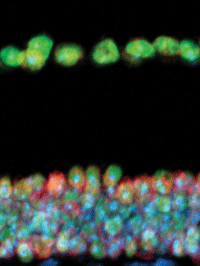Researchers have found that retinal thinning is one of the earliest signs of frontotemporal dementia (FTD) in people with a genetic risk for the disorder—even before any cognitive or behavioral changes appear.
A team at the Gladstone Institute of Neurological Diseases at the University of California San Francisco studied individuals who had a certain genetic mutation known to result in FTD. Using conventional spectral-domain optical coherence tomography, the researchers discovered that these individuals showed a significant thinning of the retina before any observable cognitive signs of dementia, when compared with people who did not have the gene mutation.
 | |
| Cross-section of the retina in a healthy mouse, showing TDP-43 (green), Ran staining (red) and nuclei (blue). |
“It is important to note that our findings were based on the average retinal thickness of at-risk or healthy people as a group, and that a single retinal scan couldn’t be used to predict dementia risk in an individual person. This is because there is significant variation in retinal thickness among even healthy individuals,” says lead author Michael Ward, MD, PhD. “However, longitudinal imaging of the same person over multiple years could be useful to look for changes in the rate of retinal thinning in people at risk for dementia, especially as a potential biomarker in the setting of a clinical study. We are currently evaluating this possibility.”
The researchers also discovered new mechanisms by which cell death occurs in frontotemporal dementia. They identified the depletion of a crucial protein, TDP-43, from the cell nuclei before any signs of neurodegeneration occurred, signifying that this loss may be a direct cause of the cell death associated with FTD. TDP-43 levels, they determined, are regulated by another cellular protein called Ran. By increasing expression of Ran, the researchers were able to elevate TDP-43 levels in mice with the FTD gene mutation, and prevent neuronal cell death.
Ward ME, Taubes A, Chen R, et al. Early retinal neurodegeneration and impaired Ran-mediated nuclear import of TDP-43 in progranulin-deficient FTLD. J Exp Med. 2014 Aug 25. [Epub ahead of print]

